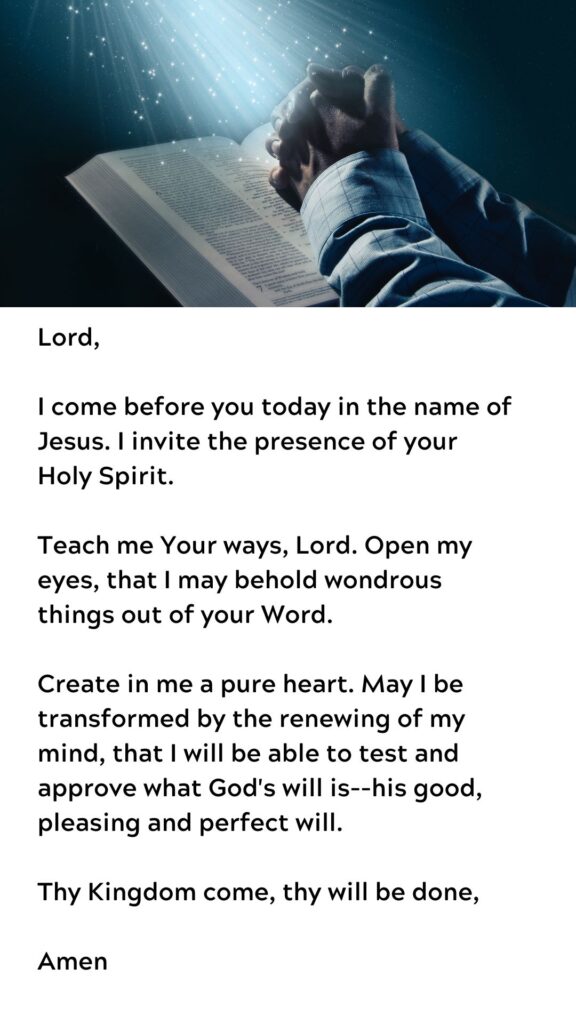I am not a Bible scholar or a pastor, and I am not formally trained in Bible study; but those things are not necessary to read the Bible and grow in your relationship with Jesus. Anyone can begin personal Bible study at any time.
The best way to start is with a personal devotion time. Some may view devotions and Bible study as different things. They may perceive Bible study as more in-depth than devotional time. My purpose is just to encourage people to get into the Word, regardless of the time they spend or the method they use. We all need to begin some place.
Remember, it is the Holy Spirit who brings life and meaning to our understanding of God’s Word. As we dig in to find deeper meaning, the Holy Spirit will speak to us in life-changing ways.
Five Tips for Bible Study
There is no one right way to study the Bible just as there is no one right way to read a book. Some people read slowly and take apart every word and every nuance. Others read quickly for overall meaning and then read again. I have done both, but I usually just start out reading and see where the Spirit leads.
The following things are helpful if you want to become a student of the Bible.
1. Selecting a Bible
Ease of Reading
Choose a Bible that you are comfortable with, that you understand, and that’s easy enough to read that you won’t give up. It doesn’t matter what other people are using. You can take recommendations; however, you are the one reading, so choose a Bible that works for you.
Don’t be afraid to choose a children’s Bible or youth Bible. That is okay if that is what is comfortable. The key is to become familiar with scripture so the Holy Spirit can speak to you. He can speak regardless of the translation. If reading has always been a struggle, you could even consider a graphic Bible. This would give a broad, overall introduction to story so you could have some context before reading a full version.
Another option is an audio Bible. You can listen to the Word if you don’t like silent reading. One advantage of an audio Bible is that you hear familiar passages frequently. You may find you have memorized portions of scripture without really thinking about it.
Choose a Translation
For a long time, I used the King James Version of the Bible. It was what I had used as a child. I love the sound of the language that many find old-fashioned. It was more familiar and appealing to me than the updated versions. But that’s me. And I have moved on from that to other versions over the years. I have used the Living Bible, the New International Version, the Amplied version, and The Message.
The American Standard Version and New American Standard Version are other popular translations. My husband likes NASV. More recently, I have seen the English Standard Version (ESV) used as reference in devotionals I’m reading.
There are many translations to choose from. Some are word for word translations and others are paraphrased. You should be aware of which type you are reading. Most experts recommend a word-to-word translation for serious Bible study, but either type is good for getting started.
I recently switched to The Message because I wanted to read a different version. I think when we read the same one over and over, the words become so familiar that we don’t always process the significance of what we are reading. Reading varied versions makes us focus on the intent of the passage.
Choose a Publisher
Christian publishers offer Bibles with varied features and styles. Most publishers offer their features in multiple translations. Thompas Nelson Publisher offers the Open Bible. I used that for many years in the KJV. Then I moved on to the NIV Women’s Devotional Bible by Zondervan Publishing, which includes devotional passages within the text. My next Bible was the Everyday Bible by Joyce Meyer (FaithWords Publisher), which is the Amplified translation. Most recently I have been using The Message. I wanted to try something in more modern language. I have not been disappointed.
I’ve listed those mentioned above, as well as other options to check below. This is by no means a complete list.
- The Open Bible (Thomas Nelson Publishers)
- The NIV Women’s Devotional Bible (Zondervan)
- The Everyday Bible (Joyce Meyer, FaithWords Publisher)
- The Message (Eugene H. Peterson, NavPress)
- The Fire Bible (Hendrickson Bible Publishers)
- The Adventure Bible (Zondervan) – A children’s Bible
- The Action Bible Series (David C. Cook) – This is a graphic Bible. It is not a full text, but the illustrations are gorgeous.
- The Story Series (Zondervan) – Bible stories presented in chronological order with NIV text. Short transitions between each chapter to connect to the continuing story. It is not a full text.
The best thing to do is try samples via Amazon or go to a Christian bookstore and see what you like. The translation is important, but so is the print size, the cover, the page style, the type of paper, and the study tools. You want something you will use and enjoy.
Built-in Bible Study Tools
Try to choose a Bible that has some study tips, history, or commentary right on the pages that you are reading. There are many Bibles like that available. Some have further references as appendices, but I think that insight directly on the page of the passage can often bring greater meaning or a different way of looking at things.
Sometimes, you will receive something from the Holy Spirit that focuses on a different lesson than the insight on the page. That’s okay, too. The Bible is God’s Word, and it is so alive. The Holy Spirit can bring meaning that we need through the text.
2. Trust Yourself
You are enough. Don’t be intimidated. You can read and understand the Bible on your own. Just need to start. Don’t worry about what others do; choose what works for you. The Holy Spirit will guide your journey.
If you get a good study Bible, you don’t need other books. There are concordances and Bible history books available, but just start with God’s Word. Then pray and allow the Holy Spirit to guide you.
3. Start Simply
- Take notes. Get a highlighter, a journal or spiral notebook, and a pen. Write down things that strike a chord with you. Write questions. Look up word meanings. Read cross-references. Soon you’ll develop a rhythm and routine of what works for you.
- Set a time and place. You need a quiet place and a specific time for serious Bible study. If you schedule a time of day for studying, you’ll be more likely to stick with a routine. Don’t worry about how much time you spend. It’s more important that you establish the time you WILL spend. I like to do Bible study and devotions first thing in the morning. The house is quiet and I haven’t gotten involved in any home projects. If I put it off in the morning, I’m not likely to squeeze it in during the day because of chores that pull my attention away.
- Begin with prayer. Before you begin your time with God, invite the Holy Spirit to come and guide you. This can be a simple prayer, but it will make all the difference in the impact of the time you spend.

4. Bible Study Tools
- Smart phone – A phone is helpful to look up historical background, geography, word meanings, and commentary, if you really get stuck. A Bible app is helpful if you want to compare translations quickly. You can also compare translations and find more study tools at Bible Gateway.
- Devotion guides – If you want specific passages to read daily, there are devotional books or subscriptions available. I have been using Our Daily Bread for years. You can have it delivered to your home every month, or you can read it online. These tools can be a jumping off place for your Bible study.
- Book study – Choose a book of the Bible to study. Start at the beginning of the New Testament or choose one of the smaller New Testament books. Or you can start at the beginning in Genesis. It’s up to you. There are devotional guides for book studies, too.
- Verse study – Choose one verse of a chapter you are reading. Take it apart word by word. Analyze one word at a time. You will be amazed at how rich a study like this can be. I have written pages of notes on small portions of scripture.
Honestly, I struggled for years in accomplishing any meaningful Bible study. I was relying on books and not digging into God’s Word myself. I found that when I began journaling and really looking at the Word on my own, it became much more interesting and a lot easier to keep committed to that daily personal time.
5. Group Bible Study
If you need more encouragement to get started, find a local group study. While you shouldn’t allow this to replace your own personal time with God, it may get you more comfortable with developing a personal approach.
Your church or another local church may offer a weekly Bible study. If not, adult Sunday School is another good option. There are also national groups that offer community Bible studies. One well-known and highly reputed group is Bible Study Fellowship or BSF. You can locate groups in your area.
Conclusion
Studying the Bible is not like studying for school. God doesn’t hand out grades. God wants you to spend time with Him. When you read His Word, you are Seeking God with All Your Heart.
As you learn more about Him and His character, you’re desire to study and spend personal time with Him will not be a chore. It will be a delight. More, you will find you need His Word and strength to help set the tone for the rest of your day.

